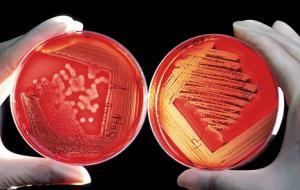
Image adapted from the National Cancer Institute. This image is in the Public Domain.
This sequence introduces students to medical microbiology, infectious diseases, and antimicrobial therapy, and focuses on pathogenesis and clinical manifestations of various infectious diseases.
Sequence Directors:
Carol Kauffman, M.D.
Donna Shewach, Ph.D.
Michael Imperiale, Ph.D.
dScribe: Cathy Mummert
Syllabus
Overview
The Microbiology/Infectious Diseases Sequence is a five week block of lectures, small group exercises, and individual assignments that comes near the end of the first year of medical school. It is a combined effort of faculty from the Divisions of Infectious Diseases in the Departments of Internal Medicine and Pediatrics, the Department of Microbiology and Immunology, and the Department of Pharmacology. The Sequence will introduce students to medical microbiology, infectious diseases, and antimicrobial therapy, and will focus on pathogenesis and clinical manifestations of various infectious diseases.
Sequence Goals
- To gain an understanding of the roles the normal flora play in maintaining homeostasis and pathogenic microorganisms play in causing disease.
- To gain knowledge about the various types of microorganisms and how they are differentiated from each other.
- To understand the pathogenesis of the most important infectious diseases in humans.
- To gain an understanding of the symptoms and signs which are commonly seen when infection occurs in different organs.
- To learn basic concepts regarding the approach to the diagnosis of infectious diseases.
- To learn the approach to establishing the cause of an outbreak.
- To understand the basis for the actions of the antimicrobial agents that are used to treat infections and the measures that are used to prevent infections.
Teaching Methods
The initial lectures will focus on basic microbiological principles and will be followed by a series of lectures on specific pathogens, clinical manifestations of infections caused by these pathogens, and antimicrobial therapy of infections caused by these pathogens. Following the series of lectures each day, Small Group Sessions will discuss various aspects of the preceding lectures in more depth or will explore related topics.
The Small Group Sessions are an integral and vitally important part of the sequence. They will consist of discussion of clinical cases and hands-on lab work. Each group will be led by one basic science faculty member and one clinical faculty member who will facilitate the discussion and the lab work. This setting provides a unique forum for discussion of the particular topic at hand.
The Small Group Sessions will begin immediately after the lectures have ended. The exact time will vary slightly every day, depending on the amount of material covered in the lectures.
Attendance at and participation in the Small Group Sessions is mandatory and is required to pass the course. If some urgent matter or illness precludes attendance at a Small Group Session, the Small Group Leader and your Class Counselor must be notified as soon as possible.
Textbooks
The text for the course is Engleberg, Dermody, and DiRita (eds), Schaecter’s Mechanisms of Microbial Disease, Lippincott, Williams, and Wilkins, April 2006. The newest edition of Goodman & Gilman, The Pharmacological Basis of Therapeutics, is the suggested pharmacology textbook. Reading about the topic before class will help you to better understand the material presented.
Computer Programs
Three computer programs dealing with immunizations, diagnostic testing, and parasitology are required course work. The Immunization Program will not only allow you to learn vaccines, in general, but will also allow you to gain knowledge about your own personal immunization profile. This program will need to be done throughout the entire five-week sequence. These programs can be accessed through the M1 portal site.
Examinations and Grading Policies
At the end of each week, a quiz will be given covering all the material from that week. There will be a comprehensive final at the end of the course. The material from week 5 will receive extra emphasis on the final examination. All tests will be available on Friday afternoon and must be finished by Monday morning. All questions will be multiple choice, true/false, or matching. Questions on each test will be drawn from lectures, small group exercises, reading assignments, multi-disciplinary conferences, and the computer programs. Examples are attached. Each weekly test will count for approximately 30-40 points, and the final examination for approximately 100 points. The weekly tests will be 1 hour long and the final examination will be 3 hours long. In addition, 40 points will be given for active participation in the small group exercises. Points will be lost for failure to come to the small group or to participate actively. A cumulative score of 75% must be reached to achieve a grade of Pass; grades are recorded as Pass/Fail.
We sincerely hope that this Sequence will be enjoyable and instructive. We urge you to talk with your Small Group Leaders as well as any of the Sequence Coordinators should any problems arise or whenever you have questions. We are here to help convey to you the sense of satisfaction that can arise from learning about infectious diseases and their management. Most importantly, we are here to help prepare you for your role on the clinical rotations and ultimately in the practice of medicine.
Sequence Instructors
Sequence Coordinators
Michael J. Imperiale, PhD
Department of Microbiology/Immunology
Carol A. Kauffman, MD
Division of Infectious Diseases
Department of Internal Medicine
Donna S. Shewach, PhD
Department of Pharmacology
Additional Faculty
Janet R. Gilsdorf, MD
Division of Infectious Diseases
Department of Pediatrics
Michele Swanson, PhD
Department of Microbiology/Immunology
Harry L. Mobley, PhD
Chairman, Department of Microbiology/Immunology
David Miller, MD, PhD
Division of Infectious Diseases
Department of Internal Medicine
Department of Microbiology/Immunology
Learning Outcomes
1. To gain an understanding of the roles the normal flora play in maintaining homeostasis and pathogenic microorganisms play in causing disease.
2. To gain knowledge about the various types of microorganisms and how they are differentiated from each other.
3. To understand the pathogenesis of the most important infectious diseases in humans.
4. To gain an understanding of the symptoms and signs which are commonly seen when infection occurs in different organs.
5. To learn basic concepts regarding the approach to the diagnosis of infectious diseases.
6. To learn the approach to establishing the cause of an outbreak.
7. To understand the basis for the actions of the antimicrobial agents that are used to treat infections and the measures that are used to prevent infections.
Reading List
The text for the course is Engleberg, Dermody, and DiRita (eds), Schaecter’s Mechanisms of Microbial Disease, Lippincott, Williams, and Wilkins, April 2006.
The newest edition of Goodman & Gilman, The Pharmacological Basis of Therapeutics, is the suggested pharmacology textbook.

Image adapted from the National Cancer Institute. This image is in the Public Domain.
Jump to:
| Document Title | Creator | Downloads | License |
|---|---|---|---|
|
04.13.09: Respiratory Viruses |
David Miller
|
||
|
04.15.09: Biopreparedness |
Sandro Cinti
|
||
|
04.17.09: CNS Viruses |
David Miller
|
||
|
04.29.09: Parasitology |
Vernon Carruthers
Cary Engleberg
|
||
|
04.30.09: Helmintic Infections |
Vernon Carruthers
Cary Engleberg
|
||
|
05.04.09(a): Herpes Viruses |
David Miller
|
||
|
05.04.09(b): Oncogenic Viruses |
David Miller
|
||
|
05.05.09: Hepatitis Viruses |
David Miller
|
||
|
05.06.09: HIV |
David Miller
|
| Document Title | Creator | Downloads | License |
|---|---|---|---|
|
Vaccines 2011: An Online, Interactive Learning Module |
Cary Engleberg
Michael Imperiale
|
| Document Title | Creator | Downloads | License |
|---|---|---|---|
|
2007 Daily Schedule: M1 Infectious Disease / Microbiology |
Dept. Staff
|
||
|
2008 Daily Schedule: M1 Infectious Disease / Microbiology |
Dept. Staff
|
||
|
2009 Daily Schedule: M1 Infectious Disease / Microbiology |
Dept. Staff
|
||
|
2010 Daily Schedule: M1 Infectious Disease / Microbiology |
Dept. Staff
|
| Document Title | Creator | Downloads | License |
|---|---|---|---|
|
04.08.08: Cellular Injury and Death I |
Aken Desai
Michael Mathis
|
||
|
04.10.08: Cellular Injury and Death II |
Aken Desai
Michael Mathis
|
||
|
04.15.08: Inflammation I |
Aken Desai
Michael Mathis
|
||
|
04.17.08: Inflammation II |
Aken Desai
Michael Mathis
|
||
|
04.22.08: Circulatory Derangements I |
Aken Desai
Michael Mathis
|
||
|
04.24.08: Circulatory Derangements II |
Aken Desai
Michael Mathis
|
||
|
05.06.08: Neoplasia I |
Aken Desai
Michael Mathis
|
||
|
05.08.08: Neoplasia II |
Aken Desai
Michael Mathis
|



